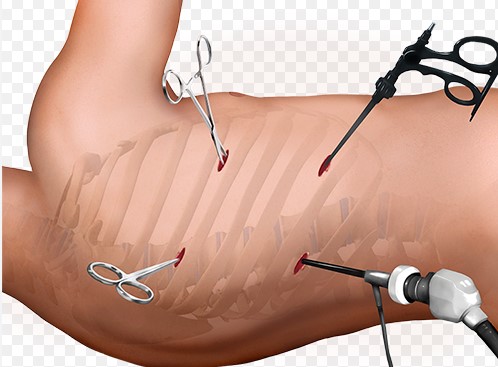Best Doctor for Thoracoscopy Treatment in India

An ordinary method to examine the surface of your lungs and the region surrounding them (pleural space) is a thoracoscopy. Your healthcare provider uses a thoracoscope to see these areas and take samples of lymph nodes or lung tissue. They can see your esophagus, chest wall, diaphragm, and other areas as well. If you are in search of the best doctor for thoracoscopy treatment in India, then contact Dr. Sheetu Singh, she is the best doctor in India for thoracoscopy surgery. Thoracoscopy is a component of video-assisted thoracoscopic surgery (VATS), a minimally invasive procedure for the chest.
These thoracoscopy surgery expert doctors in India ensure optimal outcomes and provide comprehensive treatment options for patients with various thoracic conditions. They are experts in the area thanks to their expertise, diligence, and commitment, and patients looking for the best thoracoscopy surgical care respect and trust them. Thoracoscopy has a number of benefits over open surgery, such as less trauma, shorter hospital stays, and quicker recovery times.
About Thoracoscopy Surgery
Video-assisted thoracoscopic surgery (VATS) is the more popular term for surgical thoracoscopy. Medical thoracoscopy (MT) and video-assisted thoracoscopic surgery (VATS) are the two types of thoracoscopy that are utilized.
- Medical Thoracoscopy (MT): With the help of local anesthetic and minor premedication, general surgeons and internists can both execute it. Right before the surgery, an ultrasound diagnosis is made of the patient’s pleural spaces. Radio. For thoracoscope introduction, radiographic imaging is performed to select the appropriate site. The insertion site was selected to avoid low-risk sites and any injury to the diaphragm and intra-abdominal organs. Dr. Sheetu Singh is an expert doctor for thoracoscopy surgery in India.
- video-Assisted Thoracoscopic Surgery (VATS): General anesthesia is typically used during the VATS operation. In open thoracic surgeries and single lung ventilation, it is crucial to have a skilled anesthesia team. The majority of surgeons favor lumen intubation, but single-lumen intubation is also used during VATS. Pleural effusion and parietal pleural biopsy both involve single-lumen intubation. VATS is also performed with local anesthesia and sedation.
Thoracoscopy Safety & Complication- Dr. Sheetu Singh
Thoracoscopy is generally a safe and effective procedure. The most significant complication, lung laceration, needs to be properly handled. Future goals for doctors should include mastering medical thoracoscopy, enhancing patient care following the surgery, and making an effort to lessen the likelihood of post-procedural problems. Numerous research has focused on the risks associated with talc Poudrage pleurodesis and diagnostic thoracoscopy while medical thoracoscopy is generally regarded as a safe technique. Dr. Sheetu Singh is a top doctor for thoracoscopy treatment in India.
Thoracoscopy is generally considered a safe procedure, but like any surgical intervention, it carries certain risks and potential complications. The risk of problems is nevertheless often rather minimal. Infection, hemorrhage, and harm to nearby tissues like blood arteries, nerves, or the lung itself are frequent side effects of thoracoscopy. The buildup of air in the chest cavity, or pneumothorax, can also happen during the surgery. Additionally, there is a risk of anesthesia-related complications. However, the risks are reduced because of the surgical team’s experience and the use of cutting-edge methods and tools.
Understanding Thoracoscopy Surgery Procedure
The pleural lining of the lungs and the surface of the lungs can both be examined by surgeons through a minimally invasive procedure called thoracoscopy. Internal video and images obtained from this technique help doctors to identify signs of pleural mesothelioma such as pleural plaques, inflammation, and pleural thickening.
Sometimes a Thoracoscopy is done while the patient is under a general anesthetic. Typically, a thoracoscopy lasts for 45 minutes. It involves making a hole in your chest wall and then inserting a telescope into the hole. Your doctor will inject a local anesthetic into the area where they will make the hole. Dr. Sheetu Singh is a high-level expert doctor for thoracoscopy surgery in India. After your surgery, you’ll often need to stay in the hospital for 1 to 4 days. Chest tubes may prevent you from returning home until they are removed. Thoracotomies are significant surgical procedures that are normally only suggested in the most extreme circumstances.
Thoracoscopy Hospital In India- Dr. Sheetu Singh
Rajasthan Hospital is one of the best Thoracoscopy hospitals in India. We provide unparalleled patient care and hospital experience in India for Thoracoscopy. To provide patients with high-quality care, we combine renowned specialists and cutting-edge technology under one roof. Excellent thoracoscopy services can be found at a number of famous hospitals in India. One notable Thoracoscopy hospital in India is the esteemed Rajasthan Hospital. The hospital boasts modern amenities, including cutting-edge surgical rooms with the most recent equipment. Dr. Sheetu Singh is an experienced doctor for Thoracoscopy treatment in India.

